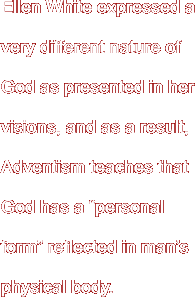HOME / PROCLAMATION! MAGAZINE / 2012 / FALL / ADVENTISM EXAMINED WITH RICK BARKER
F A L L • 2 0 1 2
VOLUME 13, ISSUE 3
D E P A R T M E N T S
 Adventism EXAMINED with Rick Barker
Adventism EXAMINED with Rick Barker
![]()
![]()
Fundamental Belief #3. Father:
God the eternal Father is the Creator, Source, Sustainer, and Sovereign of all creation. He is just and holy, merciful and gracious, slow to anger, and abounding in steadfast love and faithfulness. The qualities and powers exhibited in the Son and the Holy Spirit are also revelations of the Father.
There are serious errors in the Seventh-day Adventist theology of the Trinity (as discussed in the last edition of Proclamation!), that result in Adventism’s theology about God being erroneous even though their words about God sound orthodox. However, their Fundamental Belief statement about the Father contains nothing overt that differs from the vast majority of Christian teachings on the subject. Moreover, I have not found any additional statements by Adventist theologians indicating that the terms used in the Fundamental Belief statement have unique definitions within Seventh-day Adventism.
The concern that I have about Seventh-day Adventist doctrine regarding the Father derives from a teaching that is not discussed within this belief statement. Within Adventist theology there is an insistence that the Father is a material being with a physical body and even a physical location. For example, Jerry Moon from the Adventist theological seminary at Andrews University makes the following observations:1
“For example, one Trinitarian (sic) creed that early Adventists quoted fairly often was that of the Methodist Episcopal Church, Ellen White’s church of origin. That creed says in part, ‘There is but one living and true God, everlasting, without body or parts.’ This the early Adventists vigorously refuted, citing several biblical passages that portrayed God as having both ‘body’ and ‘parts’.
“Ellen White was also much interested in this question. Twice in early visions of Jesus, she asked Him questions related to the ‘form’ and ‘person’ of God. In one early vision, she reported seeing ‘a throne, and on it sat the Father and the Son. I gazed on Jesus’ countenance,’ she said, ‘and admired His lovely person. The Father’s person I could not behold, for a cloud of glorious light covered Him. I asked Jesus if His Father had a form like Himself. He said He had, but I could not behold it, for said He, “If you should once behold the glory of His person, you would cease to exist”’” (Early Writings, p. 54).
Scripture is clear that God is Spirit (Jn. 4:24). The Christian church has long distinguished between the physical and spiritual, and this distinction is warranted based on the words of Jesus that spirits do not have flesh and bones (Lk. 24:29) along with multiple descriptions of God as invisible (Col. 1:15; 1 Tim. 1:17; Jn. 1:18). Seventh-day Adventists emphasize the verses which speak of physical attributes of God as proof that He is a material being (Isa. 59:1; 2 Chron. 16:9; and Matt. 4:4). Christians have generally understood these attributes as anthropomorphisms or symbols to make God more understandable to us. However, Ellen White expressed a very different nature of God as presented in her visions, and as a result, Adventism teaches that God has a “personal form” reflected in man’s physical body.2 Notice that this statement from Seventh-day Adventists Believe mirrors Ellen White's thinking:
“No sinful human being has ever seen God (Ex. 33:20). We have no photograph of His features.” 3
The Adventist teaching is not that God is spirit and has no physical features, or that God is invisible. Rather, Adventist belief has to be pulled into line with Ellen White’s vision that God has a physical form and features that cannot be safely viewed by sinful man.
In summary, Seventh-day Adventism holds that the verses mentioning physical attributes of God indicate that He has a physical body. Concurrently, they do not insist on a literal interpretation of all verses regarding God's attributes, nor do they provide any real way to reconcile the verses that say that God is invisible. In contrast, mainstream Christianity includes all of the Biblical passages on the subject with an explanation that reconciles the apparent differences. †
Endnotes
- Moon, J. (2006) “The Quest for a Biblical Trinity: Ellen White’s 'Heavenly Trio’ Compared to the Traditional Doctrine”. Journal of the Adventist Theological Society, 17,1, 140-159.
- Seventh-day Adventists Believe, 2008, ed., Pacific Press Pub. Assoc., p. 98.
- http://www.sdanet.org/atissue/books/27/27-03.htm

Copyright 2012 Life Assurance Ministries, Inc., Casa Grande, Arizona, USA. All rights reserved. Revised October 2, 2012. Contact email: proclamation@gmail.com

Rick Barker is a native of Southwestern Ohio and facilitates a weekly Bible study for former and transitioning Adventists in the Dayton, Ohio, area. Rick graduated from Andrews University in 1987 and received a Masters degree from the University of Dayton. Rick and his wife Sheryl formally left the Adventist chuch in 2004. Prior to this they had been active in the Miamisburg and Wilmington, Ohio, churches. They currently attend Living Waters Lutheran Church in Springboro.

